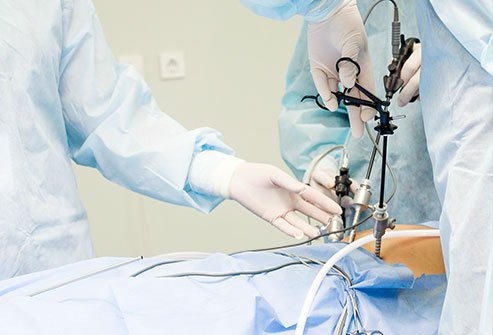What Is Operative Laparoscopy?
What is operative laparoscopy?

Operative laparoscopy is a type of minimally invasive surgery that is useful in the diagnosis and treatment of abdominal disorders. Laparoscopy involves the insertion of a thin, flexible, tube-like instrument into the patient’s abdomen. While performing operative laparoscopy, the physician inserts additional instruments, such as
- Probes
- Scissors
- Grasping instruments
- Biopsy forceps
- Electrosurgical or laser instruments
- Suture materials
Operative laparoscopy may be indicated in
- Treatment of scar tissues around the fallopian tubes and ovaries (adhesions)
- Removal of ovarian cysts
- Treatment of ectopic pregnancy (embryo implants somewhere other than the uterus)
- Blocked fallopian tubes
- Removal of fibroids from the uterus
- Removal or destruction of the endometrium that grows outside the uterus, ovaries or peritoneum
- Removal of diseased ovaries and damaged fallopian tubes
- Removal of the appendix
- Removal of the gallbladder
- Tubal ligation (permanent sterilization procedure for women)
The operative laparoscopy approach has several advantages, such as
- Short hospital stays
- Better cosmetic result
- Fast recovery and earlier return to daily activities
- Less risk of postoperative scar tissue formation
When should operative laparoscopy be avoided?
People with the following conditions shouldn’t undergo operative laparoscopy
- Raised intracranial pressure (extreme pressure within the skull)
- Shock
- Retinal detachment (a condition where the retina pulls away from supportive tissue)
- Pregnancy
- Large pelvic masses (tumors in the area between the two hip bones)
- Ventriculoperitoneal shunt (surgery to remove excess cerebrospinal fluid in the cavities of the brain)
- Compromised cardiopulmonary status (heart conditions that affect the heart’s ability to pump a sufficient amount of blood to the rest of the body)
- Obesity
- Abdominal hernia
- Cancer
- Previous laparotomies (a surgical incision into the abdominal cavity for diagnosis or in preparation for major surgery)
How do you prepare for an operative laparoscopy?
Before the surgery, take care of the following things
- Don’t take aspirin or any medications that have aspirin in it.
- Inform the physician about allergy to any medicines, latex, tape, iodine or anesthesia.
- Inform the physician about all the medicines that the patient takes.
- Do not use tampons, vaginal creams, douche or have sexual intercourse before the procedure.
- Inform the physician about any history of bleeding disorders.
- This procedure is usually done when the patient is not menstruating.
- Inform the doctor if the patient is pregnant.
How is operative laparoscopy performed?
Operative laparoscopy is performed under general anesthesia. The physician makes three to four small incisions in the abdomen. Next, the physician inserts a specialized instrument with a video camera attached, known as a laparoscope, into the abdomen through the incision near the navel. The physician also inserts additional instruments, such as
- Probes
- Scissors
- Grasping instruments
- Biopsy forceps
- Electrosurgical or laser instruments
- Suture materials
With the help of a laparoscope, the physician examines the pelvis including the uterus, fallopian tubes, ovaries, bladder and appendix to identify the issue. After identifying the issue, the physician may treat the disorders and close the incision.
What can you expect after operative laparoscopy?
Following operative laparoscopy, the patient may expect the following things
- The navel area may be tender and bruised.
- Anesthesia may cause nausea and dizziness.
- Daily activities can be resumed after a few days.
Contact the physician if the patient observes
- Abdominal pain
- Worsening nausea and vomiting
- A temperature of 101° F or greater
- Drainage of pus from an incision
- Significant bleeding from an incision
